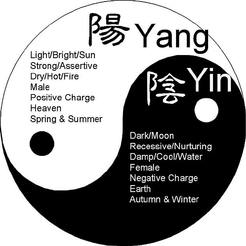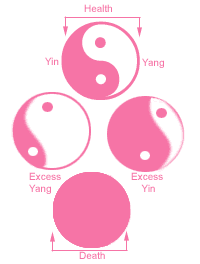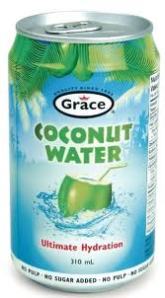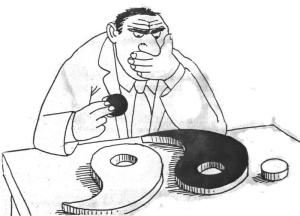It doesn’t happen often I get to practice my newly acquired skills on my parents, since the Atlantic Ocean keeps us apart for most of the year. So when they came over this summer to travel British Colombia with me, I made sure I brought my equipment with me, including my acupuncture kit. You never know when an opportunity presents itself.
Having spent numerous vacations in the Alps, we are all avert mountain hikers, so we were excited to explore the Rocky’s with it’s famous crystal blue lakes and stunning views. Our first hike was supposed to be a warm-up – a gentle warning to our bodies about what was yet to come. Yet my mom was struggling to keep up with the rest, breathing heavily and frustrated with her perceived “unfitness”.
Something wasn’t right. My mother has climbed mountains for longer than I can remember and has an overall active lifestyle. The level of activity required for this hike just didn’t justify her struggle. What was going on?
Some background information: one year prior to this my mom experienced severe heart palpitations, and was diagnosed with atrial fibrillations. Her doctor prescribed Beta-blockers to slow down her heart rate. A common side-effect of this medication is fatigue, especially when the heart rate is kept so low that it’s unable to do its job when the bodies demand for oxygen increases – like during physical exercise. Not only did my mom experience this debilitating side-effect, the palpitations persisted, though less severe. While she had tried discontinuing the drug on several occasions, the uncomfortable irregular heart beats several days later had forced her to comply.
Atrial fibrillations – some statistics
Atrial fibrillation is an heart arrhythmia that occurs when erratic electrical signals in the heart cause the atria to contract rapidly and irregularly. This prevents the smooth flow of blood into the ventricles, which can cause blood to pool in the atria, increasing the risk of a blood clots and stroke.
- About 6% of the population over 65 years of age and older live with atrial fibrillation (Sacco et al, 1997).
- After the age of 55, the risk of developing atrial fibrillation doubles with each decade of life (Sacco et al, 1997, Benjamin et al, 1994).
- Individuals with atrial fibrillation have 3 to 5 times greater risk for ischemic stroke (European Heart Rhythm Association et al, 2010).
- It is estimated that 20% of all strokes are caused by atrial fibrillation (European Heart Rhythm Association et al, 2010).
At first I felt slightly intimidated by this medical
 diagnosis and, being a beginner practitioner, not sure if I could help. But then it dawned on me that this diagnosis is just a label given to a symptom (heart arrhythmia’s). This same symptom is often part of a different type of diagnosis in Traditional Chinese Medicine (TCM). A TCM diagnosis is not based on just one symptom, but is based on a combination of symptoms and characteristics of the whole person. Depending on what else is going on in the body and mind, the TCM diagnosis can be further refined. For example, my mom being menopausal with hot flushes was another important aspect of her TCM picture.
diagnosis and, being a beginner practitioner, not sure if I could help. But then it dawned on me that this diagnosis is just a label given to a symptom (heart arrhythmia’s). This same symptom is often part of a different type of diagnosis in Traditional Chinese Medicine (TCM). A TCM diagnosis is not based on just one symptom, but is based on a combination of symptoms and characteristics of the whole person. Depending on what else is going on in the body and mind, the TCM diagnosis can be further refined. For example, my mom being menopausal with hot flushes was another important aspect of her TCM picture.
 A quick Google search resulted in a number of studies supporting my thoughts. Atrial fibrillations have been successfully treated with acupuncture. And so have hot flushes and other menopausal symptoms, resulting from a deficiency of Yin (the female principle, which is cooling and lubricating), and a relative excess of Yang (the male principle, which is warming and drying). Balancing Yin and Yang is key to prevent illness. Yin can be depleted during menopause, but also by stress, worry, and long work hours with little time for self-care and relaxation – all too common in our contemporary societies. Besides heart palpitations and hot flushes, some other Yin deficiency symptoms include night sweats, thirst with no desire to drink (or just in small sips), a dry mouth and throat at night, mentally restless but tired, vague anxiety and fidgety, and frequent waking during the night.
A quick Google search resulted in a number of studies supporting my thoughts. Atrial fibrillations have been successfully treated with acupuncture. And so have hot flushes and other menopausal symptoms, resulting from a deficiency of Yin (the female principle, which is cooling and lubricating), and a relative excess of Yang (the male principle, which is warming and drying). Balancing Yin and Yang is key to prevent illness. Yin can be depleted during menopause, but also by stress, worry, and long work hours with little time for self-care and relaxation – all too common in our contemporary societies. Besides heart palpitations and hot flushes, some other Yin deficiency symptoms include night sweats, thirst with no desire to drink (or just in small sips), a dry mouth and throat at night, mentally restless but tired, vague anxiety and fidgety, and frequent waking during the night.
Acupuncture can help restore this delicate balance by stimulating specific points on the meridians, and so can some simple lifestyle modifications.
Lifestyle modifications to replenish Yin:
- Avoid foods that may over stimulate your Yang energy. These include stimulants like caffeine, herbs like Chinese ginseng, and foods that are too heating such as curries, hot peppers and deep fried or roasted foods. Instead eat foods that are moistening and lubricating, and use plenty of water when cooking. Soups and stews are a great way to replenish Yin.
- Sleep: Get to bed early (10pm) at least three times a week. How restful your sleep is depends on what you do before bedtime, for example eating large meals, or drinking alcohol late in the evening, creates heat while being metabolized, and can disrupt your sleep. Likewise, vigorous exercise, watching TV or reading just before bedtime can disrupt your sleep patterns.
- Learn how to meditate. Once learned, you can meditate while walking up and down in an airport departure lounge, or on a railway station, or while waiting to pick up your children from school.
- Learn a simple form of exercise that you can do daily. A 10-minute exercise regime you can do every day and that keeps you fit without over-straining yourself, is better than busting yourself in the gym 3 times a week. Also try to take a 20 minute walk every day, during which you walk fast enough to get slightly out of breath, so that you can only just carry on a conversation.
- Treat yourself to body treatments such as a rejuvenating massage, sauna’s, and of course regular acupuncture sessions.
Dietary changes for atrial fibrillations – a Western medicine perspective
 Avoid known triggers. Reduce or eliminate known triggers such as caffeine (coffee, tea, chocolate), alcohol, wheat and other gluten-containing grains, tyramine-containing foods (such as aged cheeses), sugar & artificial sweeteners and additives like aspartame and MSG.
Avoid known triggers. Reduce or eliminate known triggers such as caffeine (coffee, tea, chocolate), alcohol, wheat and other gluten-containing grains, tyramine-containing foods (such as aged cheeses), sugar & artificial sweeteners and additives like aspartame and MSG.
- Balance electrolytes. An average Western diet contains more sodium (added to most packaged foods) and calcium (in dairy products), and less potassium and magnesium. A proper balance between sodium and potassium is essential for a regular heartbeat. To maintain this balance, sodium intake should be less than 2400 mg per day, and potassium intake should be increased, preferably through foods (two of the best sources are blackstrap molasses and coconut water. Others: prunes, oranges, tomatoes, raisins, apricots, etc.). Supplementing potassium is another option. The calcium – magnesium balance also affects heart rhythm, and magnesium is often deficient. Calcium is required for muscle contractions, and magnesium for muscle relaxation. Food sources of magnesium include dark green, leafy vegetables and nuts, whole grains, and fruits, but most people would benefit from supplementation.
- Stay hydrated. Dehydration can contribute to atrial fibrillation. Coconut water is the ideal beverage, which is high in potassium and magnesium, and low in sodium and sugars. Water and herbal teas are another way to ensure proper hydration.
All good end good?
My mom responded well to the acupuncture sessions and was able to stay off the Beta-blockers and hike with us the rest of the vacation. While she is still busy trying to wrap her mind around how the hell these funny little needles took care of her symptoms, she is now considering seeing an acupuncturist in the Netherlands.
And me? For me this was a great lesson of gaining confidence in myself and the treatment modalities I apply. And no better person to learn this with than my own mom.


